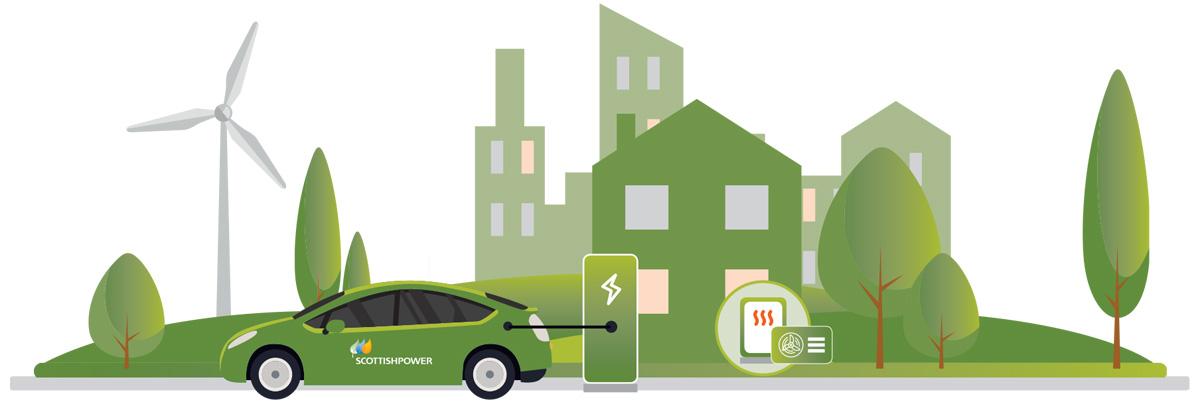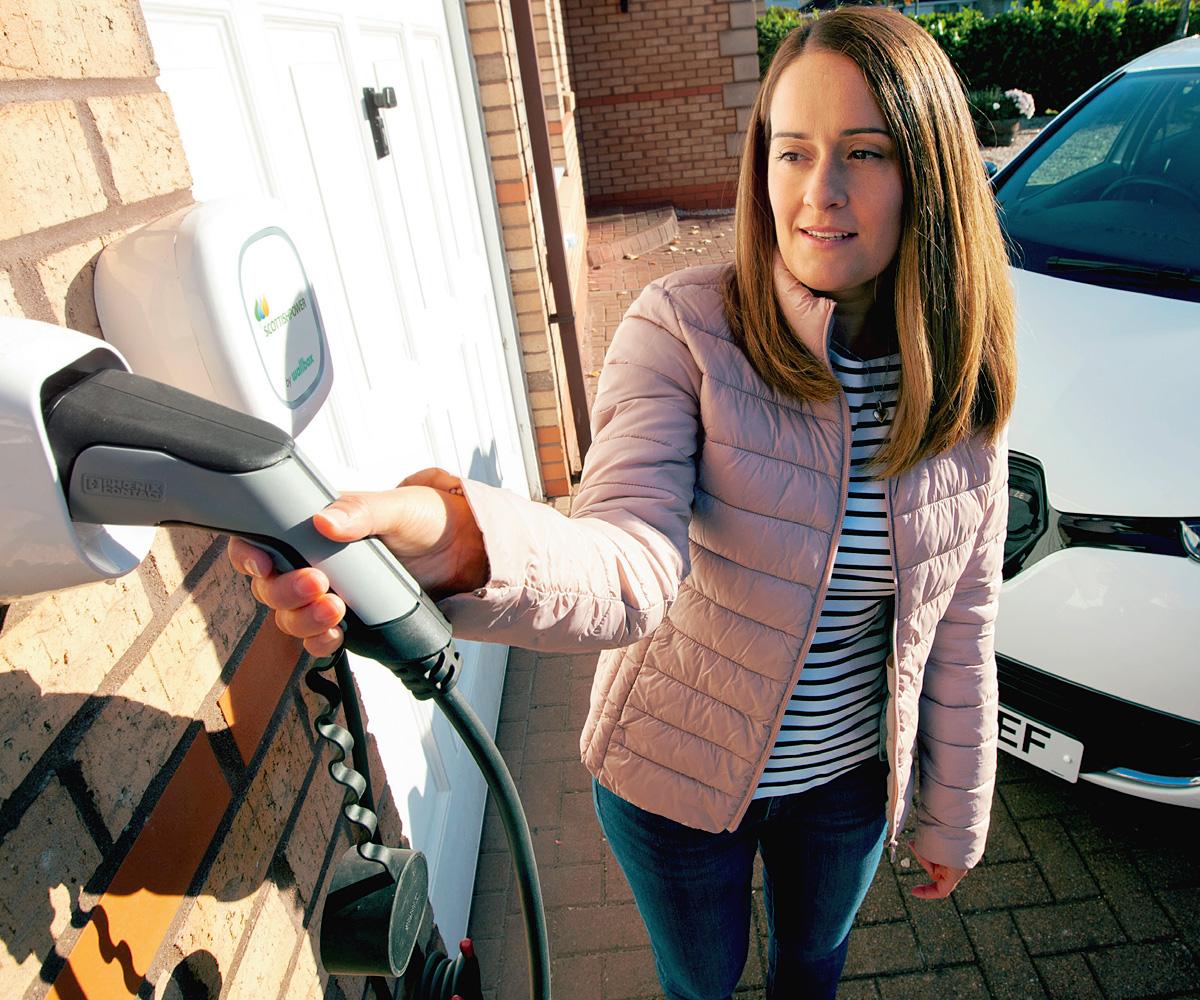- Local road map to Net Zero – Zero Carbon Communities – launched by ScottishPower
- "Being honest with" communities about the scale of challenge the only way to tackle climate change, argues ScottishPower CEO
- Giving local communities a stronger voice in how their areas reach Net Zero would help to deliver environmental benefits more quickly
- UK will need an average of 4,000 EV charging points and domestic heat pumps installed per day to meet 2050 Net Zero Target
ScottishPower and SP Energy Networks today launched Zero Carbon Communities – the first detailed roadmap to show how local communities can play their part in reaching the UK’s NetZero targets, as the country transitions to an electric future.

In a few short years, our roads will look very different as electric cars and buses become common. And the way we heat our homes and businesses will change as well, as energy efficient systems based on heat pumps replace gas networks.
Based on forecasts commissioned by ScottishPower from Capital Economics, the independent research consultancy, today’s report outlines that the UK will need to install more than 25 million electric vehicle charging points and nearly 23 million heat pumps to meet its 2050 Net Zero target. That’s more than 4,000 EV charging points and heat pumps every day from now until 2050.
For the first time, Zero Carbon Communities sets out the details of what this means at a local level, with its launch in Liverpool. In coming months, the Zero Carbon Communities campaign will roll out to other areas served by SP Energy Networks – including major cities like Edinburgh and Glasgow, and rural communities in Anglesey and Fife – to reflect how different places have differing needs.

By recognising there is no ‘one size fits all’ model, and by setting out clear information for communities about the scale of the challenge, ScottishPower wants to work at local levels to make sure its networks support and deliver a greener energy future for all. Doing this will ensure local communities will have a system that works for them, and will allow them to reap the benefits of their share of over 115,000 new jobs.
Capital Economics estimates the total cost of transforming the UK’s transport and heating systems, as well as upgrading the electricity grid to manage this increased demand, to be £286 billion by 2050. Of that, £48 billion is the estimated cost of reinforcing the electricity networks. Crucially, however, much of the work and the investment will need to be in place by 2035.

By investing in a planned and strategic way, SP Energy Networks believes there is potential to reduce significantly these overall reinforcement costs. To do this, the framework in which networks operate needs to change, and work has to start now. In launching Zero Carbon Communities, ScottishPower is calling for three things:
- Devolve more power so that communities have a proper say in setting carbon priorities in their areas.
- Start making plans for investments now to meet the needs of communities in making the transition to Net Zero.
- Ensure that all regulation has the ambitions of meeting decarbonisation targets at its core.
Launching the roadmap in Liverpool, Keith Anderson, CEO, ScottishPower, said:
"We know electricity demand will more than double as we move away from the fossil fuels that power our cars and heat our homes today.
“We all need to do more to address climate change and this campaign sets out how we think government and the regulator can help communities drive their own transition to zero carbon.
"More power needs to be devolved locally so that communities have a stronger voice in plans to decarbonise their neighbourhoods. And investment needs to start now to meet the scale of the challenges we face. Crucially, to support the innovation and investment required to drive local priorities the government has to ensure all regulation has Net Zero as a guiding principle.
"We think this data should be a wake-up call for policy-makers. Zero Carbon targets may seem like a long way off, but if we’re to work with communities properly to ensure people aren’t left behind by the green transition, the reality is there’s no time to lose."

Commenting on ensuring our communities have a stake in their electric future, Frank Mitchell, CEO, SP Energy Networks, said:
"To reach Net Zero, every community will need to make changes. And each community will be unique in that journey. In that sense, one size does not fit all, and we understand the importance of being responsive to local communities.
"Our aim is simple. To help local communities understand that urgent action will have to be taken to manage the Net Zero transition successfully, by giving them a clear sense of the scale of the change, and an understanding of how every household will be affected.
"Working in partnership with local councils, businesses, and other stakeholders, Zero Carbon Communities aims to develop a roadmap for regions served by SP Energy Networks in order to help them plan and prepare. By investing in a planned and strategic way, we’re confident we can support communities on the journey to Net Zero with cost-effective solutions that work for them.”
Liverpool City Region – which has set a 2040 Net Zero target – is the first of the Zero Carbon Communities to launch, and provides a clear demonstration of the local approach needed to reach net zero.
Steve Rotheram, Metro Mayor of the Liverpool City Region, said: "We declared a Climate Emergency and became the first Combined Authority to set a target of being net carbon zero by 2040 precisely because we recognise the importance of urgent action at a national and local level.
"Hitting our target will require significant changes to how we use energy – and how we live our lives. We are working towards achieving that change and I welcome this initiative that also tackles the challenges we face head on."
Following on from the Liverpool launch, the Zero Carbon Communities campaign will roll out to other areas across the territory that SP Energy Networks serves. Typical communities have been selected within the SP Energy Networks territory and include Glasgow, Edinburgh, Fife, Dumfries and Galloway, East Ayrshire, Cheshire and Warrington, and the Isle of Anglesey.
